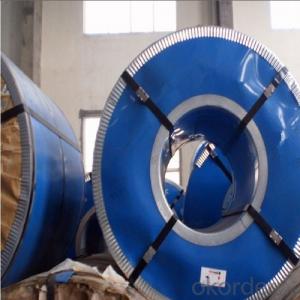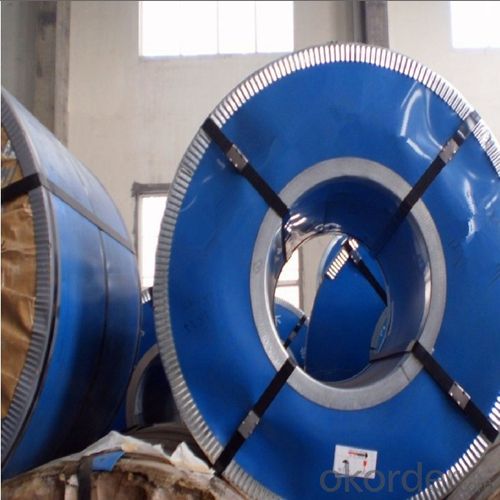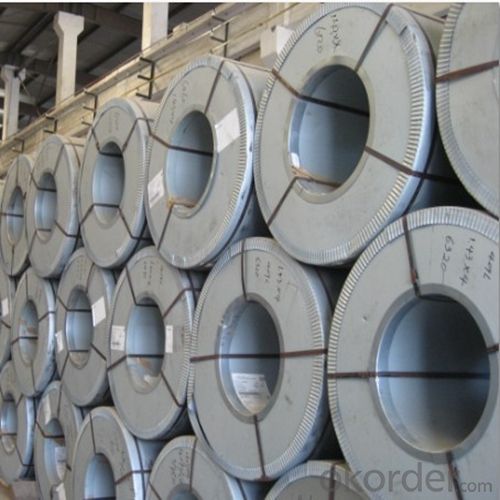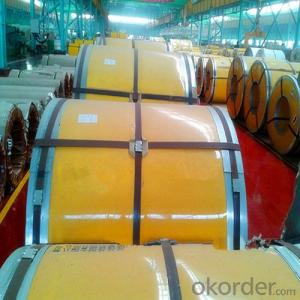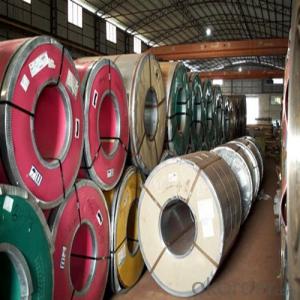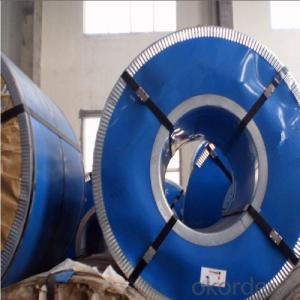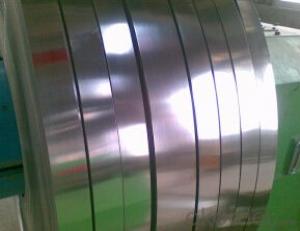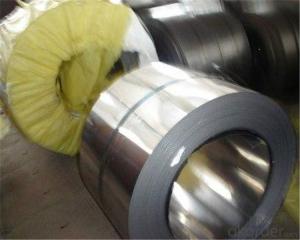Stainless Steel Coil Hot Rolled Cold Rolled 2B/BA JIS, SUS
- Loading Port:
- Guangzhou
- Payment Terms:
- TT OR LC
- Min Order Qty:
- 100 m.t.
- Supply Capability:
- 5000 m.t./month
OKorder Service Pledge
OKorder Financial Service
You Might Also Like
1.Structure of Hot Rolled Stainless Steel Coil 2B/BA:
Stainless steel coil is a production which not easy rust, acid resistance and corrosion resistance, Stainless steel coil is a new kind of Austenite stainless steel by used Mn, N replace Ni. so it is widely used in light industry, heavy industry, daily necessities and the decoration industry. Stainless steel coil has good corrosion resistance and hot / cold processing performance, instead of stainless steel products for used in the not high of corrosive environment, such as indoor, inland city outdoor etc.
2.Main Features of the Hot Rolled Stainless steel coil:
1) High Quality: Using Latest automated control equipment to ensure the quality
2) Best Price: With most automated equipments to ensure our price is lower than the market
3) Fast Delivery: The delivery date within 20 das after get your order
4) Best Service: Our after-sell service team will help you to slove all the problems about the order
3. 304 Stainless steel coil Images
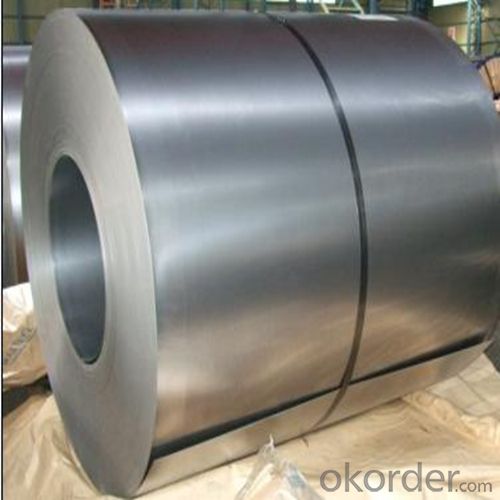
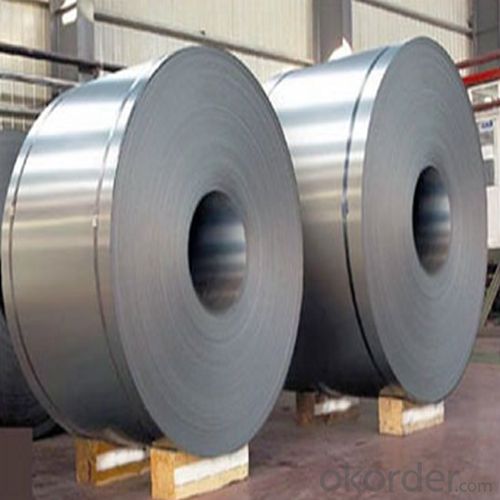
4. 304 Hot Rolled Stainless steel coil2B/BA Specification
Product name: 304 Stainless Steel Coil
Thickness: 0.2mm to 1.5mm
Technical: Cold Rolled
Width: 10mm to 1240mm
Type: 200 Series
Length: As customer's requested
Standard: JIS, SUS
Finish: BA, 2B, 8K, NO.3, NO.4, HL
MOQ: 100 MT
Ship Term: FOB Shenzhen port or CNF import port
Delivery Time: 15 to 20 day after the receive the deposit or LC
Packaging: By wooden pallet, wooden case or according to customer's request
5.FAQ
We have organized several common questions for our clients,may help you sincerely:
1) How about your company?
2) A world class manufacturer & supplier of castings forging in carbon steel and alloy steel,is one of the large-scale professional investment casting production bases in China,consisting of both casting foundry forging and machining factory. Annually more than 8000 tons Precision casting and forging parts are exported to markets in Europe,America and Japan. OEM casting and forging service available according to customer’s requirements.
- Q: I just got this aftermarket exhaust on my truck and it's recommended that it be welded, but the metal is aluminized steel. How do I mig weld aluminized steel?
- aluminized steel is just std steel with a coating applied to it to keep it from rusting. It welds just like std mild steel. You need to prep the joint and thats it. Use a wire wheel, brush, sandpaper or what ever to clean the joint of the pipes where you will weld. You don't have to get too crazy here. Just a quick brush/wipe with sand paper over the joint and your ready to weld. For mig welding, I would use a 75/25 gas mix, .023 or .030 solid steel wire, around 50-70 amp setting (on most migs this will be #2 heat setting) and around 3/10th to 4/10th wire speed. (some welders will list 0-10, others 0-100, so figure your scale, like 0-10 it would be 3-4, one that list it by 10's then it would be 30-40)
- Q: How are steel coils used in various industries?
- Steel coils are used in various industries for their durability and versatility. They are commonly used in automotive, construction, and manufacturing industries for making structures, machinery, and appliances. Steel coils are also utilized in the energy sector for producing power generation equipment and in the transportation industry for making ships and railcars. Overall, steel coils play a significant role in providing strength and reliability in a wide range of industrial applications.
- Q: I recently got in a car accident with a steel mailbox, on a snowy day. I was wondering if i can do anything since the steel mailbox caused my car to be totaled. Otherwise it would have been fine and would have suffered only minor damage. Anything I can do here to maybe get some money back? Thanks!
- This will be a collision claim for you, if you have collision you can file a claim and you'll have to pay a deductible, whatever it is. The owner of the mailbox can also file a claim on your insurance since you damaged his/her mailbox. If you don't have collision coverage you won't get squat - this accident is 100% your fault. The steel mailbox didn't cause your car to get totaled, your driving did.
- Q: where to buy Transformer steel?Used in transformers and electric motors.
- Electrical Steel Suppliers
- Q: I want to get a new knife but i cant decide if i wan a spyderco pacific salt or a cold steel ak47
- What exactly are you using it for? Personally I would go with Cold Steel AK47. It's a good all around knife for hunting, combat, stabbing and slashing as well as everyday use. Well balanced tip and very little bladeplay which can be a problem with a cheaper knife. Both are good companies but the CS AK47 wins hands down for me.
- Q: how come when i put steel legs in lowest price in grand exchange no one buys them i got 101 steel legs in there and there at lowest price and they have been there for 3 days
- Becuase you should sell something else.
- Q: Im in the process of replacing the gutters/down spouts on my house. The top of the house is four sided. The bottom level has a porch area with 3 sides, two smaller roofs in the back, and one small roof on the side with all stainless steel gutters. A two story house. Not sure of the demensions. They were made at a Steel Mill where the previous owner, worked.This guy wants to buy the stainless gutters but I need to know the market value of this steel and offer him a price. Can someone tell me what I can sell it for? Does it go by the pound? Foot? Can you give me an idea please? Theres a lot of it! I have no clue what to do! Thanks!
- Steel is at an all time high of $3.99 per hundred pounds..Stainless will sell for more....I haulled a pickup truck full 3 days ago and got over a 100 bucks for junk I had laying around the yard.
- Q: How are steel coils used in the manufacturing of exhaust manifolds?
- Steel coils are used in the manufacturing of exhaust manifolds as they are rolled into specific shapes and sizes to form the primary structure of the manifold. The coils are cut, bent, and welded together to create the required geometry, ensuring the exhaust gases flow smoothly and efficiently from the engine. Additionally, the steel coils provide the necessary strength and durability to withstand high temperatures and the harsh conditions of the exhaust system.
- Q: How do we use steel ?plesase answer, its for homework xxx
- Strength of metals is normally measured by the tensile strength as the main measure although this is not the only property as hardness is another big factor. Basically, iron is soft and steel is hard. Plain iron is stretchy and does not corrode quickly, whereas steel is much stiffer and corrodes more quickly. The tensile strength of cold worked iron is about half that of an average steel, likewise the hardness is about half that of steel too. Pure iron, which is rarely used, is even weaker and softer again and a bit more like softer materials like copper and aluminium. Where confusion comes in is that there is another iron - Cast Iron - which is totally different to both iron and steel. Cast iron is very hard and tough but incredibly brittle so its properties are very different.
- Q: What are the different types of steel coil packaging systems?
- There are several types of steel coil packaging systems available, including horizontal coil packaging machines, vertical coil packaging machines, and coil wrapping machines. Each system is designed to securely package steel coils for transportation and storage, ensuring their protection from damage and corrosion.
Send your message to us
Stainless Steel Coil Hot Rolled Cold Rolled 2B/BA JIS, SUS
- Loading Port:
- Guangzhou
- Payment Terms:
- TT OR LC
- Min Order Qty:
- 100 m.t.
- Supply Capability:
- 5000 m.t./month
OKorder Service Pledge
OKorder Financial Service
Similar products
Hot products
Hot Searches
Related keywords
